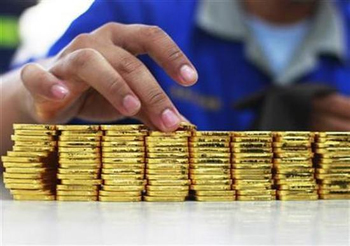 New Delhi, Jan 27: The restrictions on gold imports will be reviewed by March end, Finance Minister P Chidambaram said today.
New Delhi, Jan 27: The restrictions on gold imports will be reviewed by March end, Finance Minister P Chidambaram said today.
"I am confident that by the end of this year we will be able to revisit some of the restrictions on gold import but we will do so only when we are absolutely sure that we have a firm grip on the current account deficit," he said while addressing tax officials at the Customs Day here.
To contain the rising gold imports, the government had increased customs duty on the yellow metal three times in 2013. The levy currently stands at 10 per cent.
Besides, the Reserve Bank has also linked imports of the metal to exports amid a widening CAD and depreciation of the rupee.
Gold imports, which touched a high of 162 tonnes in May, fell to 19.3 tonnes in November in the wake of a series of curbs by both the government and the RBI.
The imports in December was a "little higher" than in November, Finance Secretary Sumit Bose told reporters.
Chidambaram said there has been about 1-3 tonnes of gold smuggled into the country every month following the restrictions imposed on shipment last year.
"I know gold smuggling has increased...But the restrictions on gold import were absolutely necessary because it is these restrictions which have brought down gold import which in April and May had crossed 300 tonnes.
"If we had not imposed restrictions, there was no way we could have managed balance of payments or the current account deficit," he said.
With the clamour for a duty cut on gold imports growing, Congress President Sonia Gandhi had last week written to Commerce Ministry in this regard.
Gold imports constitute the second biggest component in the import bill after crude oil. Spurt in gold import had pushed CAD to a record high of USD 88.2 billion or 4.8 per cent of GDP last fiscal.
Chidambaram said the long-term method to control the CAD is not to indulge in policy repression by restraining the import of gold.
"The long-term goal is to increase exports. We have to earn as many dollars as we need through exports to pay for imports. We need to find ways to increase exports," he said.
For the April-December period, exports aggregated USD 230.3 billion and imports USD 340.3 billion, with the trade deficit at USD 110 billion.
In value terms, gold and silver imports in April-December period declined 30.3 per cent to USD 27.3 billion from USD 39.2 billion during the same period a year earlier.
To restrict gold imports, the RBI in August last year had said entities should ensure that at least one-fifth, or 20 per cent, of every lot of import of gold is exclusively made available for the purpose of exports and the balance for domestic use.
Chidambaram said these restrictions were necessary to contain CAD.
"While we have lost some in perhaps tightening the gold smuggling, we have gained tremendously in terms of controlling the current account deficit and being able to manage the balance of payments and bringing about large stability in the currency," he said.
The government expects to bring down the CAD, which is the difference between the inflow and outflow of foreign exchange, to USD 50 billion in current fiscal from USD 88.2 billion in 2012-13.
The CAD in the first half (April-September) of current fiscal narrowed to USD 26.9 billion (3.1 per cent), from USD 37.9 billion (4.5 per cent) in the first half of 2012-13.
Declining gold imports has also contributed to the improvement in CAD, which dropped to 1.2 per cent in second quarter, as against 4.9 per cent in the first quarter.





Comments
Add new comment